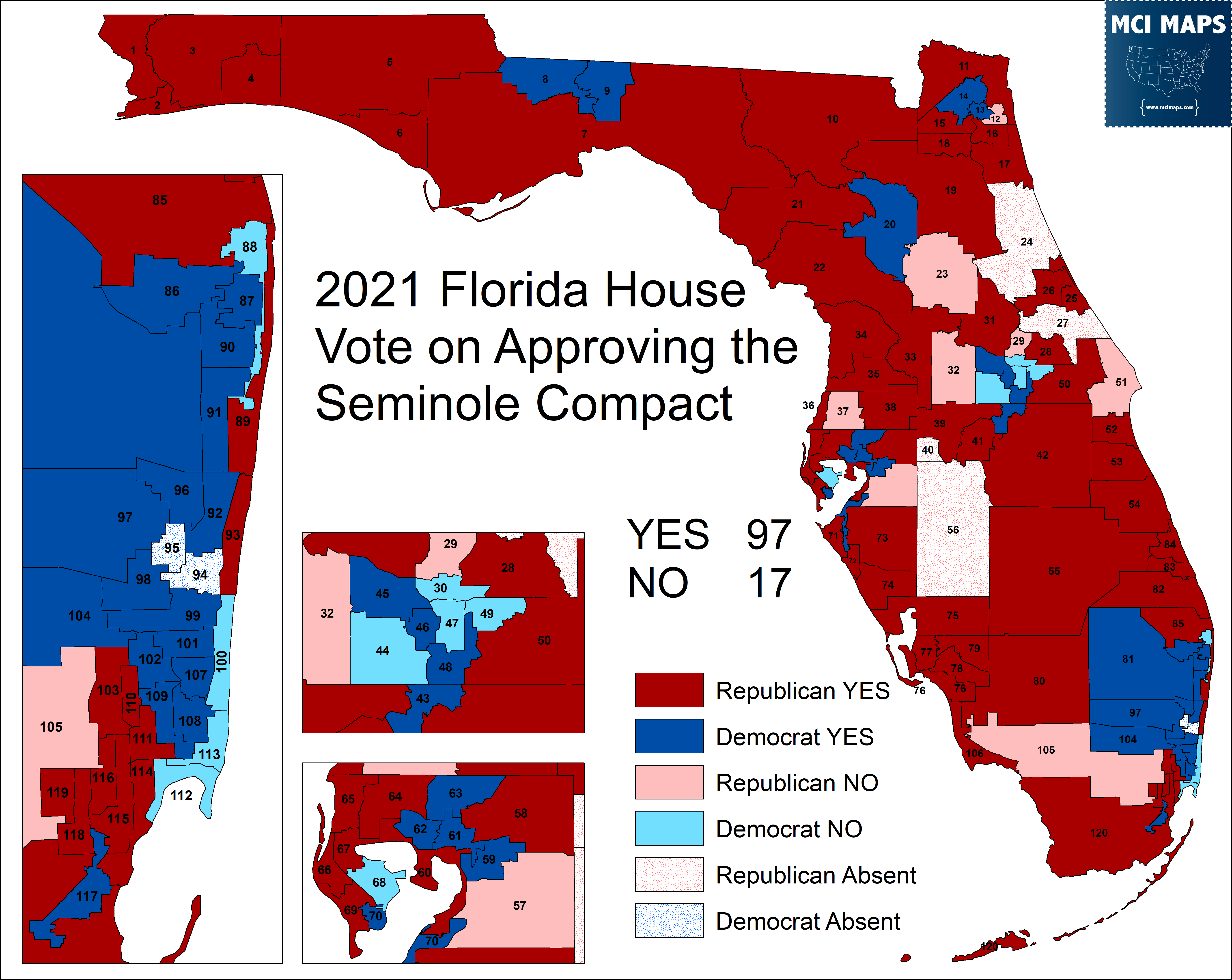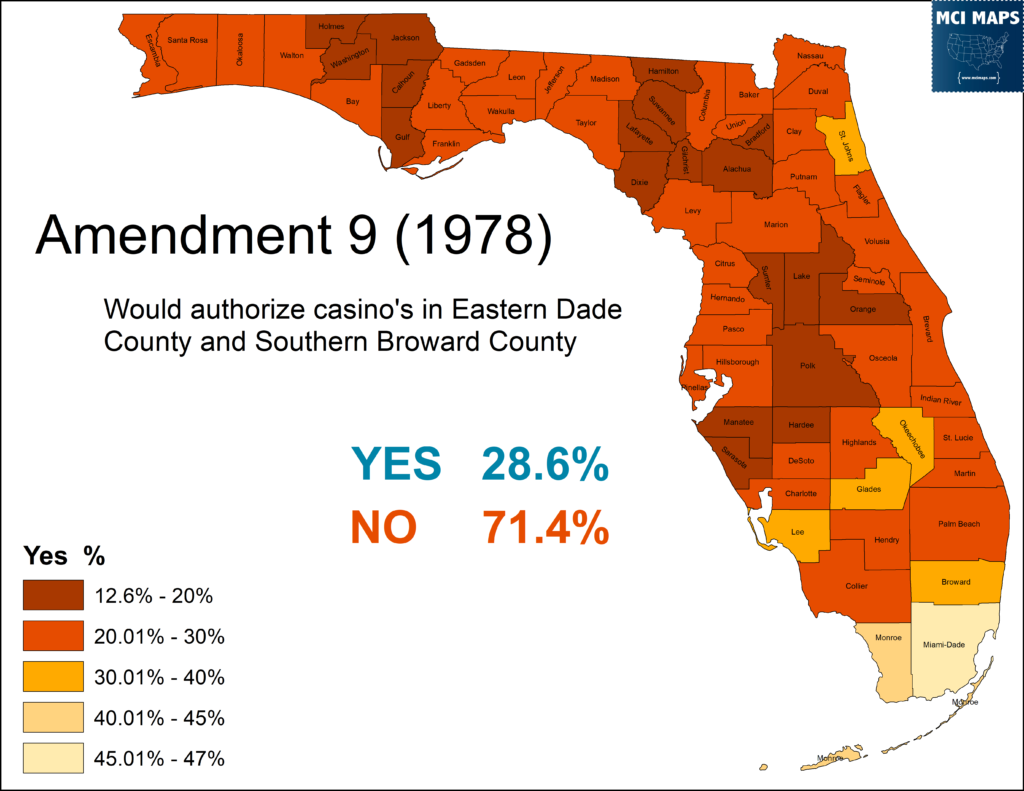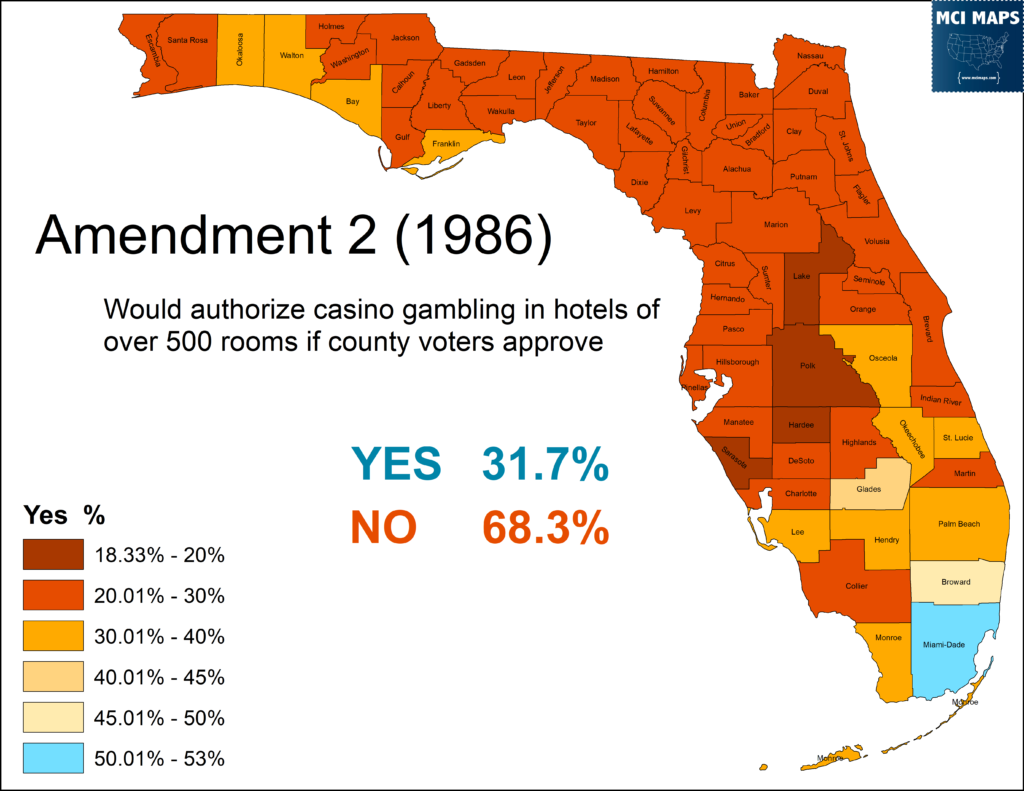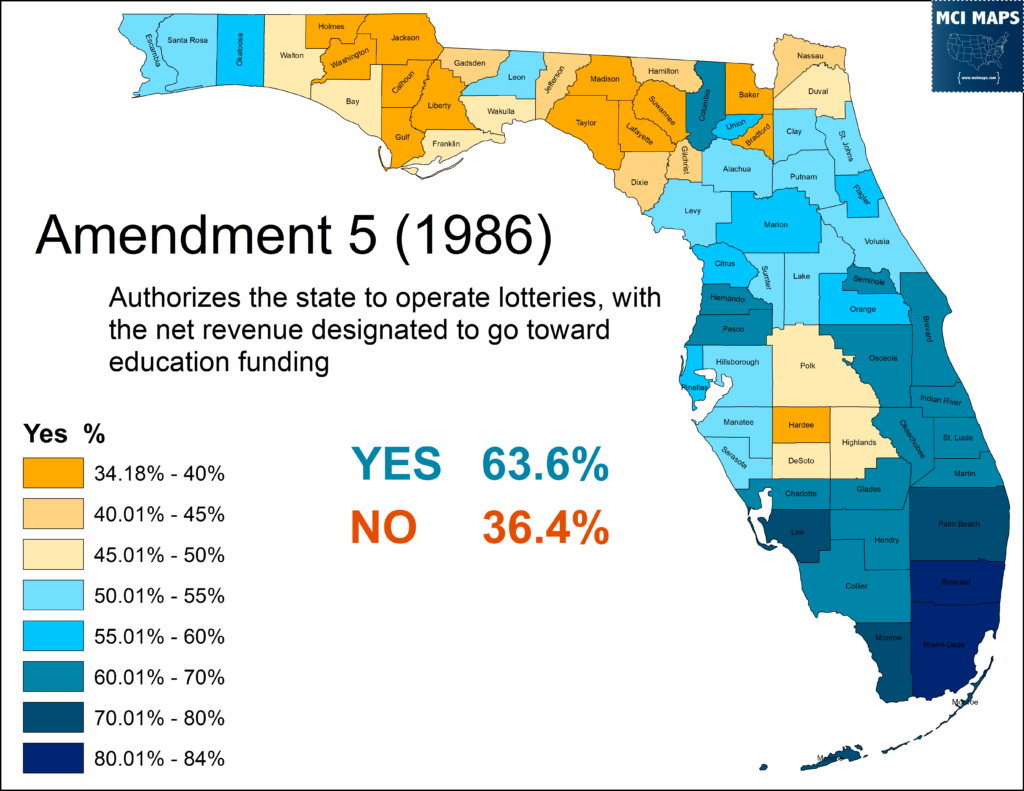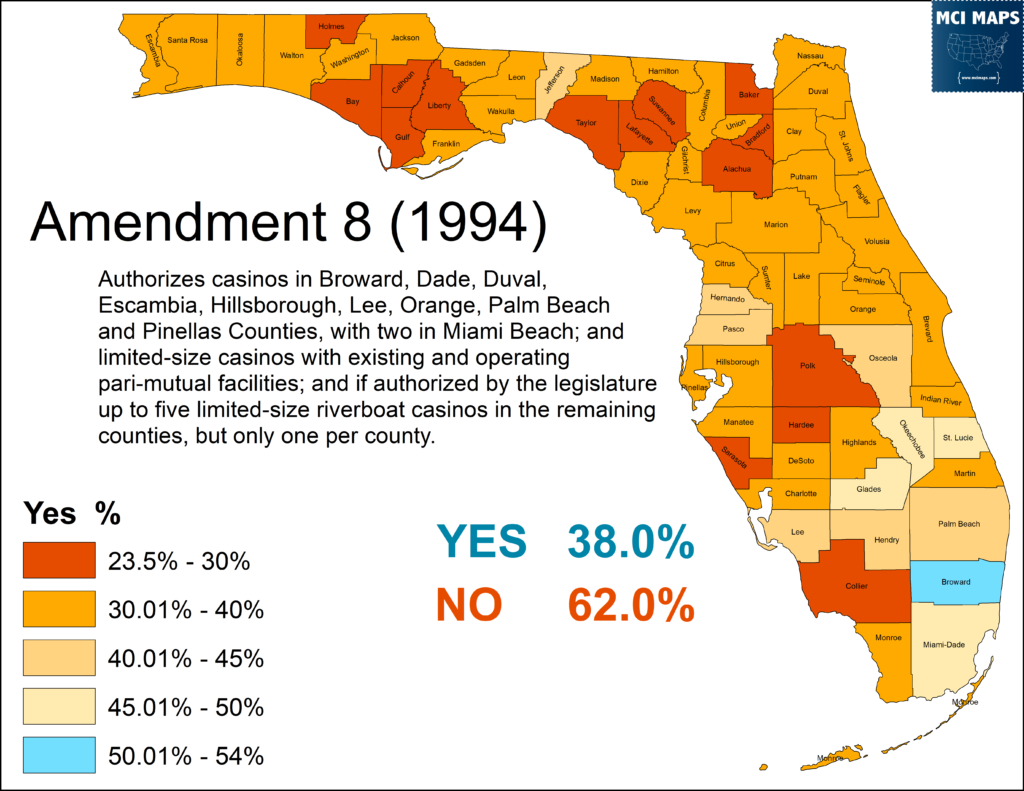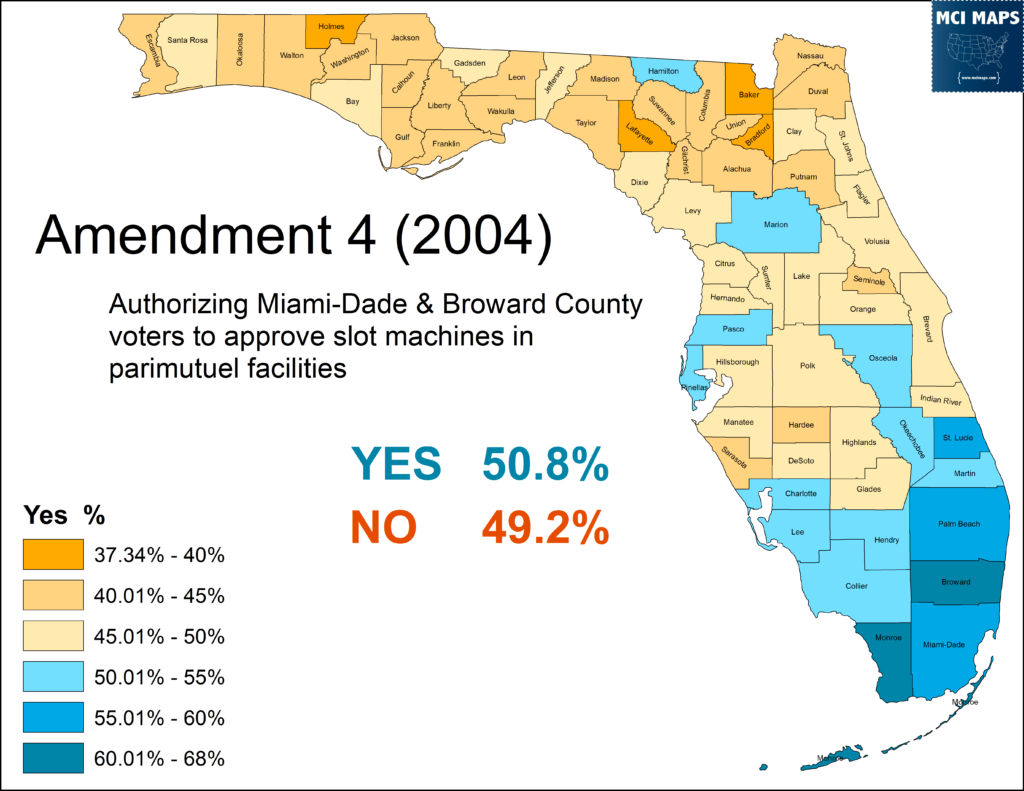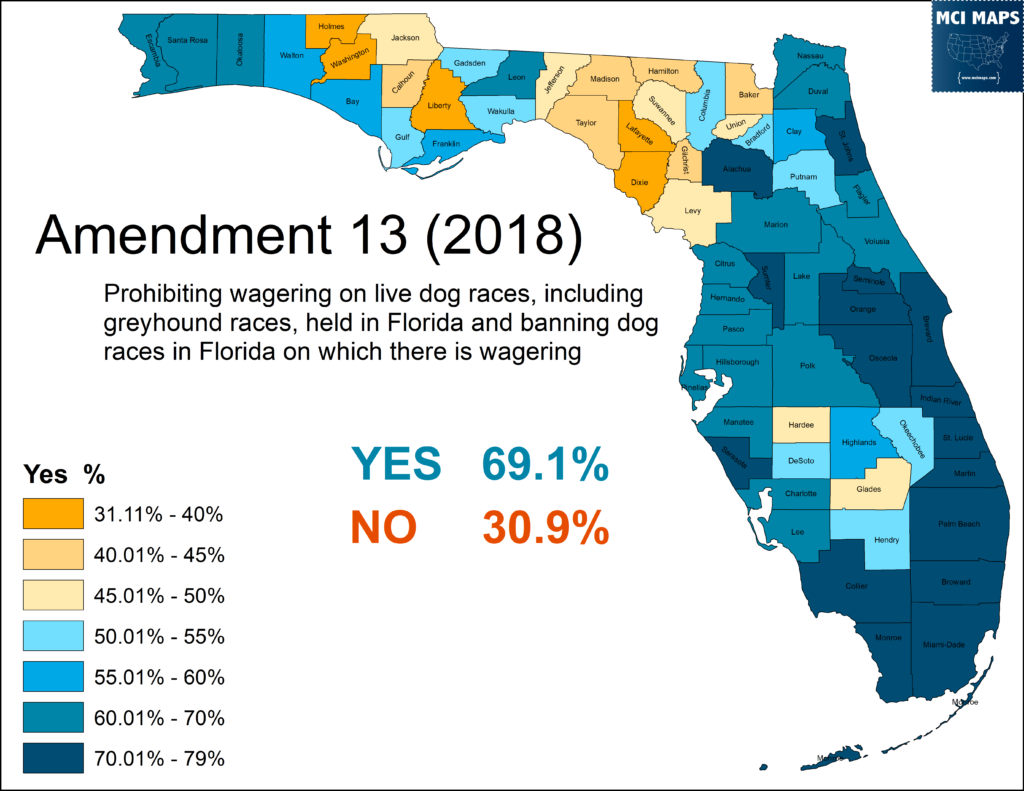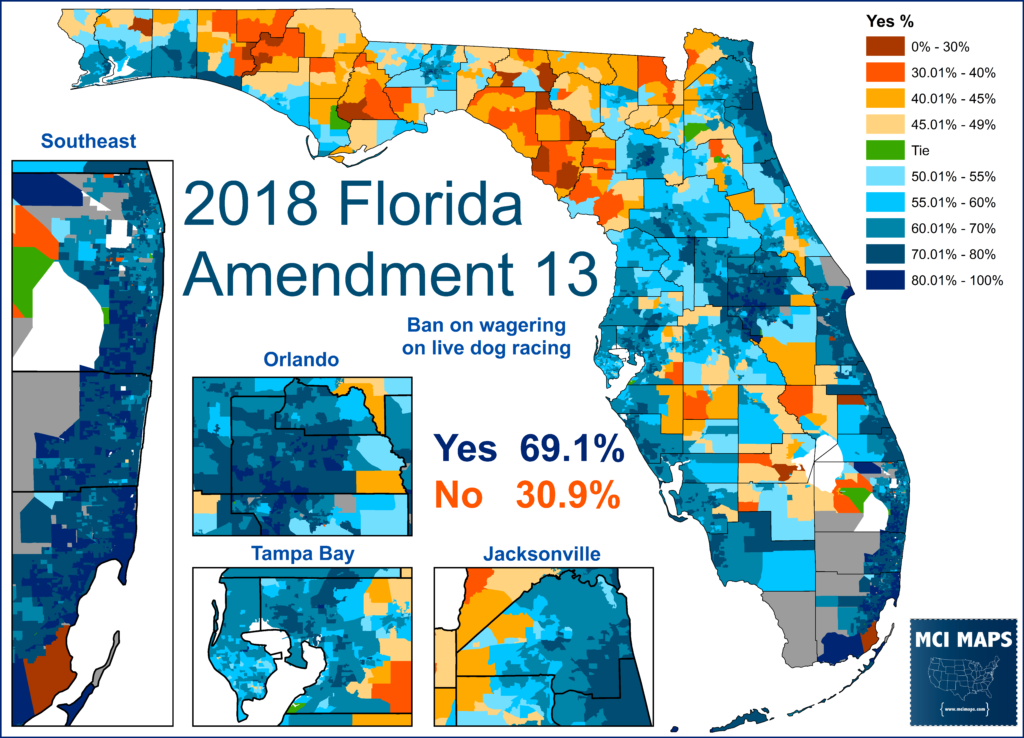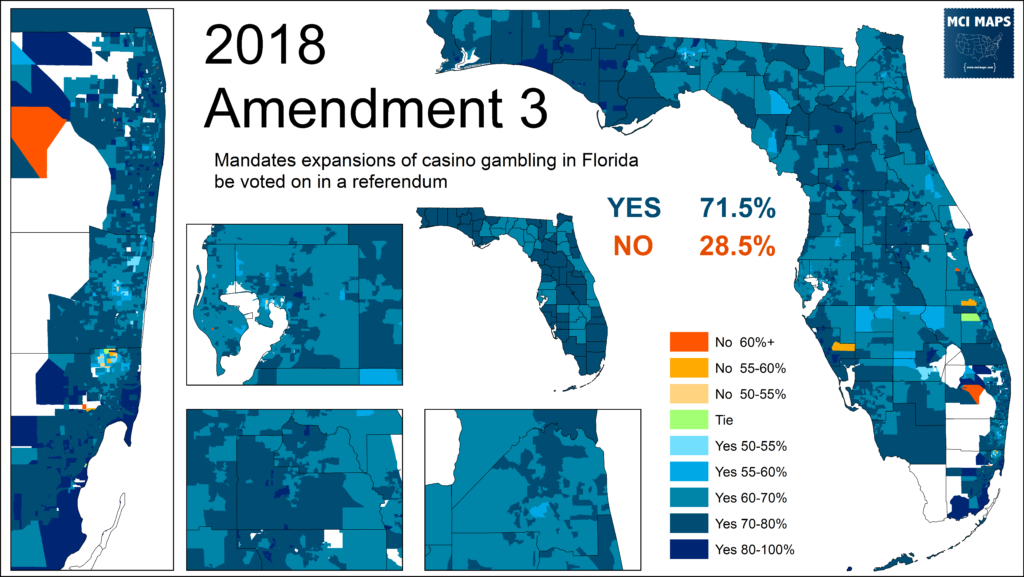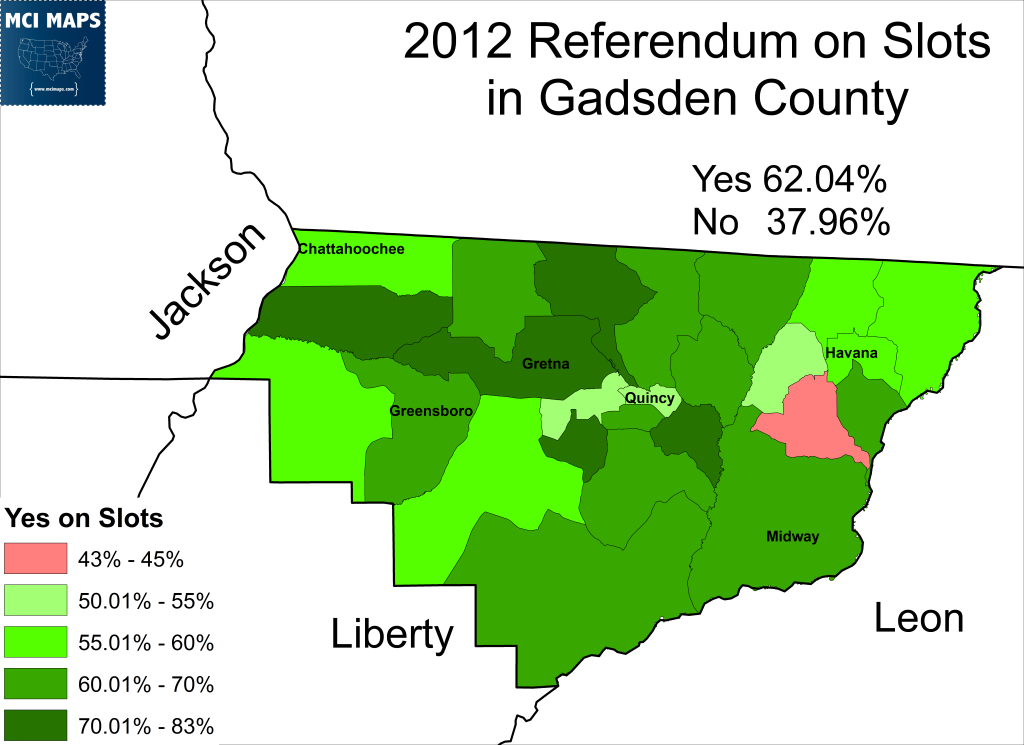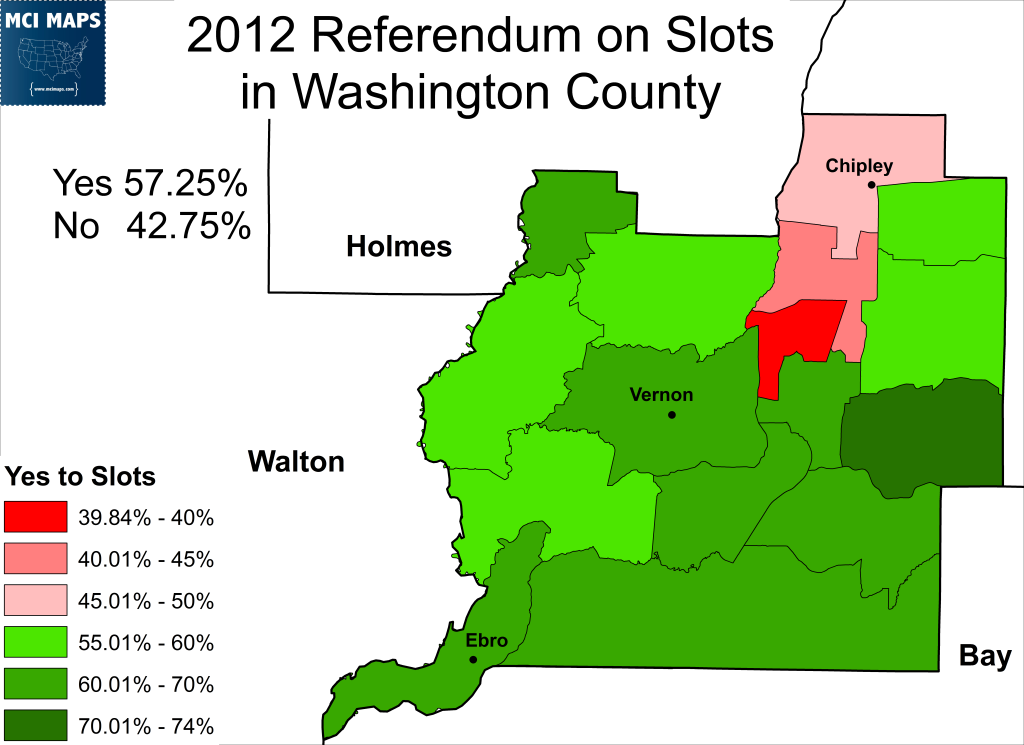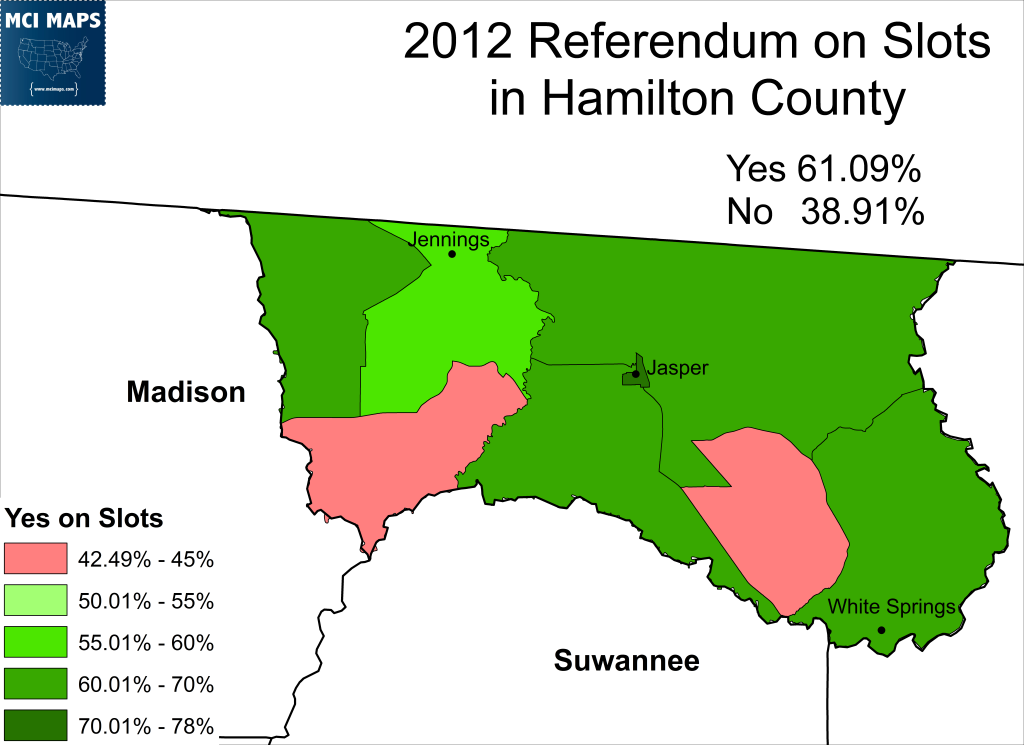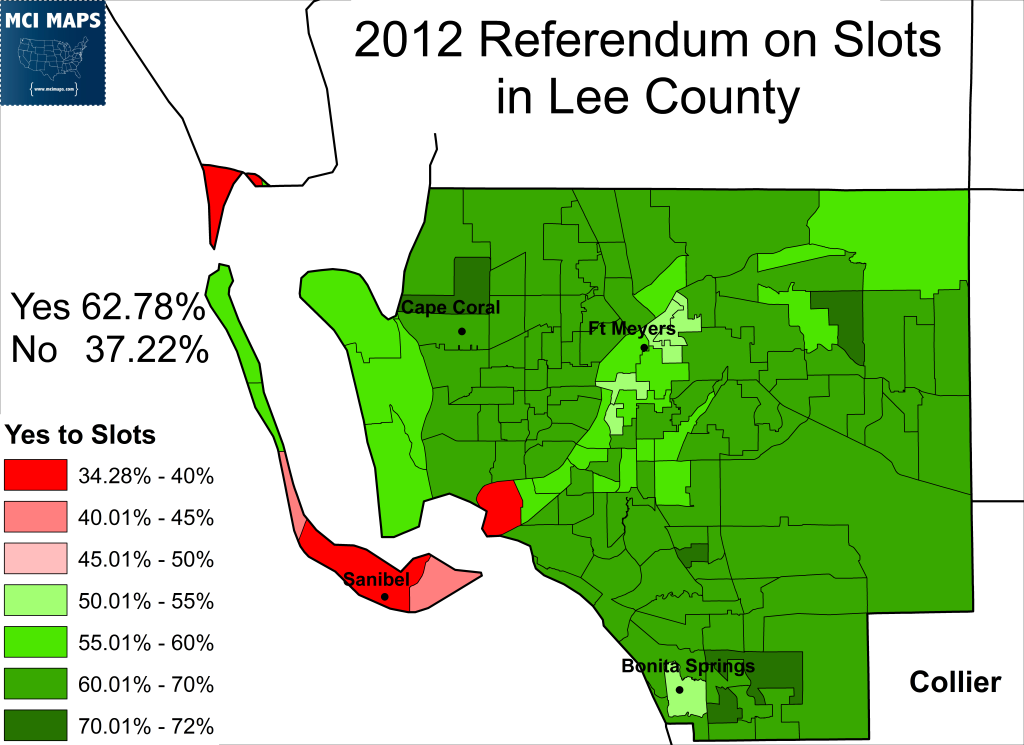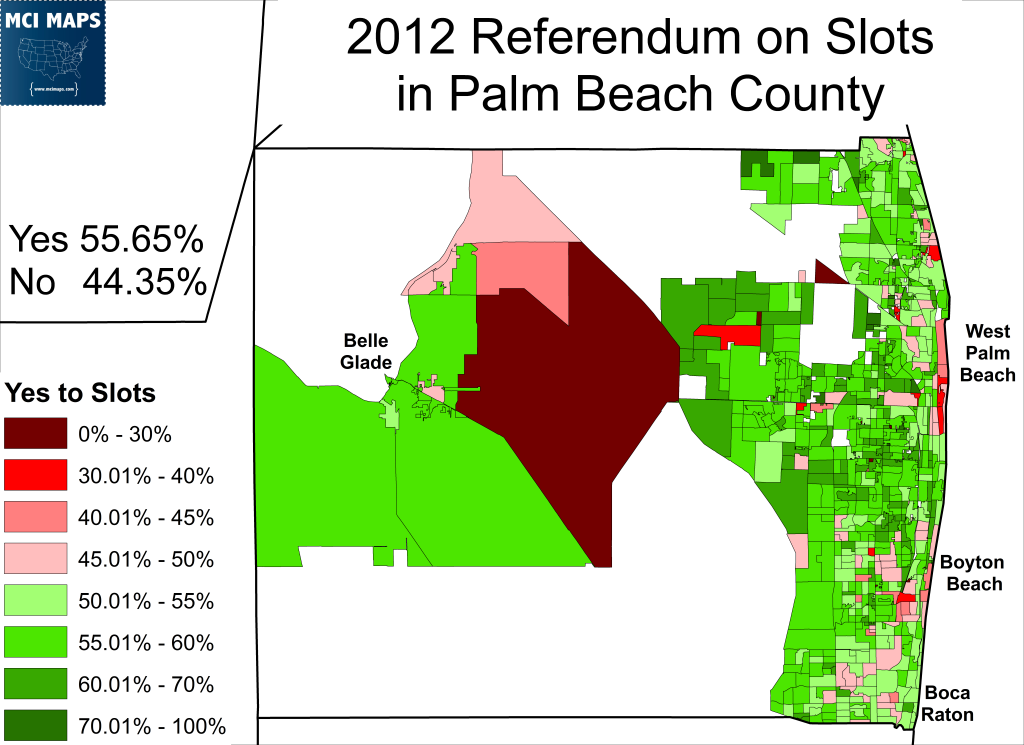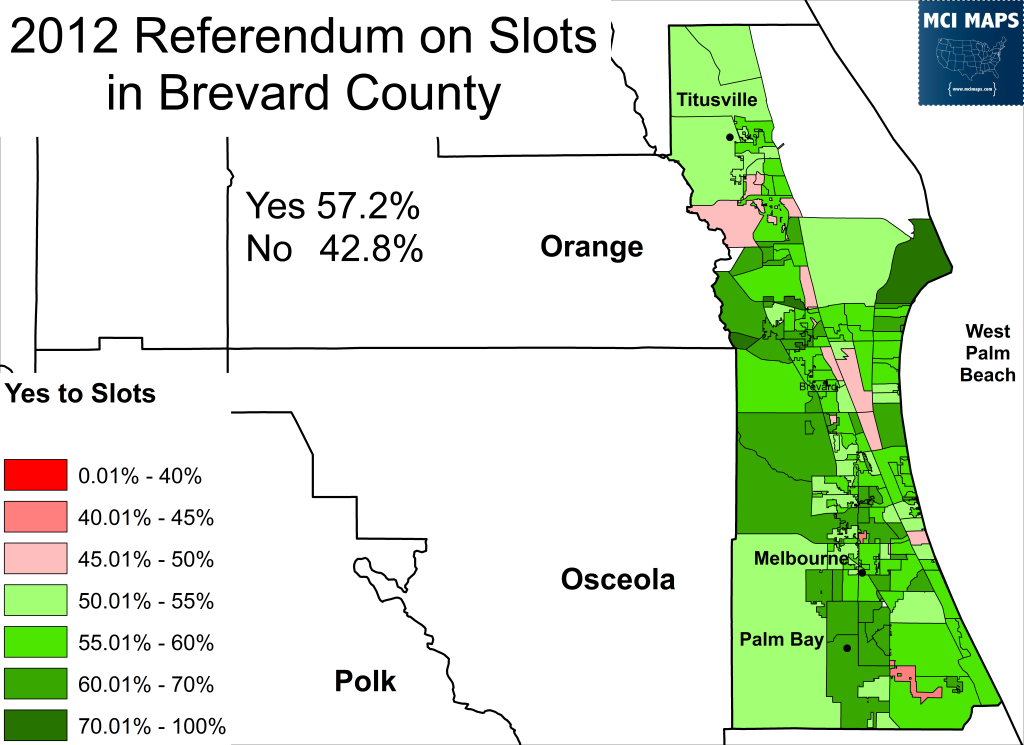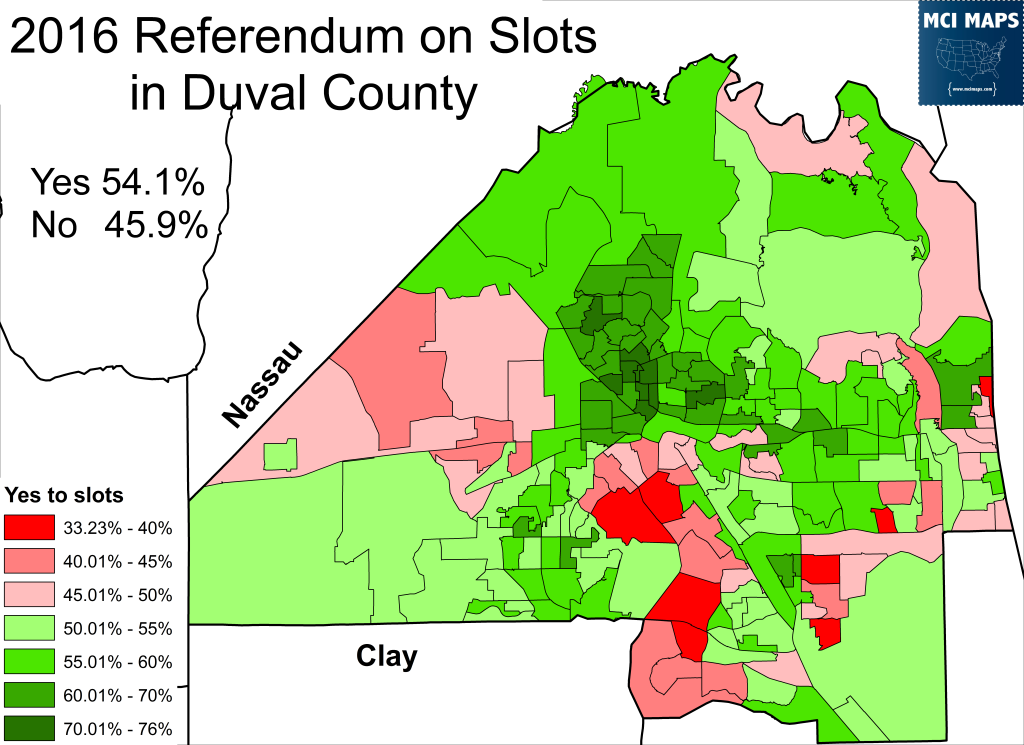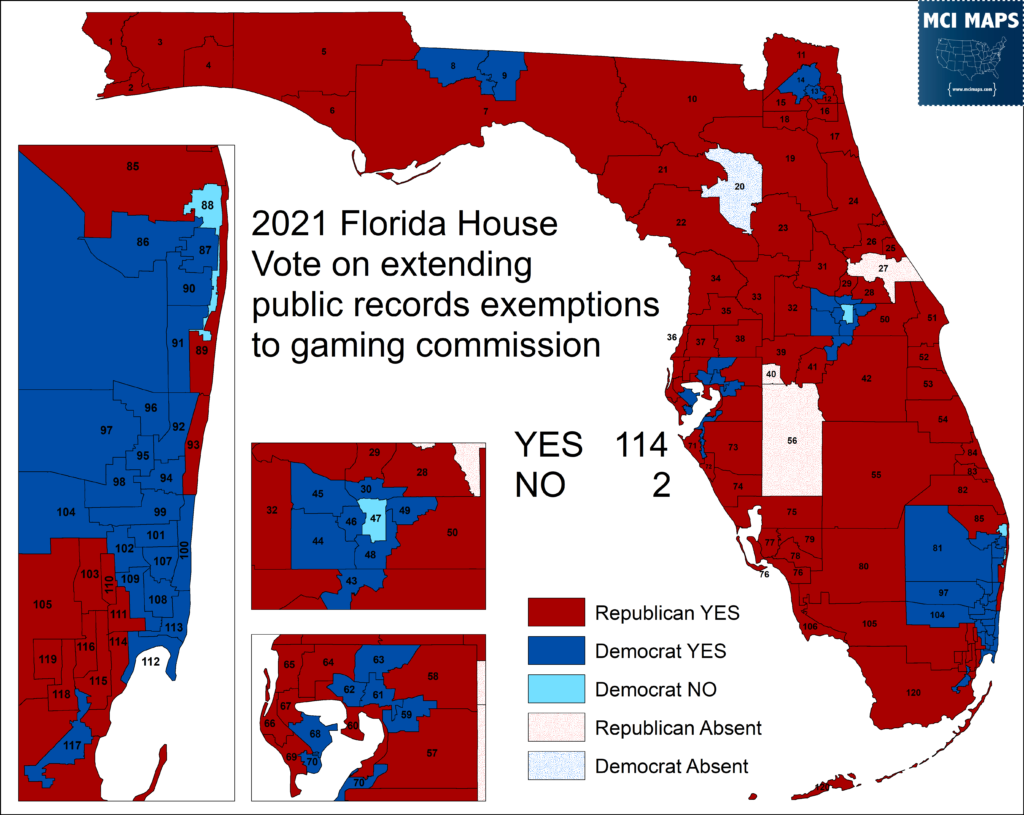Last week, the Florida legislature signed off on a massive gambling compact worked out between Governor Ron DeSantis and the Seminole Tribe of Florida; which will result in a massive expansion of legalized gambling in the state. With the lobbying and voting all wrapped up, I decided to take a look at the history of gambling in Florida.
Gambling Legislative History in FL
Gambling in Florida has been around (legally) since the Great Depression era. A fun timeline of the issue can be found here and here. I’ll offer this following summary as well. This is gambling ONLY related to legislative action. Gambling in the Seminole Reservations will be covered in a separate section.
- The legislature passed horse and dog racing in 1931, overriding the veto of then-Governor Carlton.
- In 1935, slot machines and betting on Jai-alai (a popular sport in South Florida)
- However, slots only survived for two years, being repealed in 1937 as a conservative push-back began.
- Small-stakes bingo legalized in 1970
- Florida legalized penny-ante poker (pot cannot exceed $10) at private homes in 1989
- Poker legalized at pari-mutuel facilities (places where betting is happening on racing & Jai-alai) in 1996 (same pot limit)
- Poker betting raised to $2, with maximum three-raise limit, in 2003
- Voters approved 2004 referendum to allow slot machines in Broward and Dade county betting facilities
- Betting at pari-mutuels raised from $2 to $5, and no-limits Texas Holdem, and higher-stakes poker tournaments legalized in 2007
- Legislature passes no-limit poker in 2010
Gambling has also shown up on the Florida ballot multiple times. Voters have generally had an aversion to huge gambling expansions. This has not stopped big-money interests from working to pass measures directly with the voters and circumvent the more conservative legislature.
Gambling on the Ballot
An expansion of casinos outside of the Seminole lands have never been especially popular in Florida. South Florida has had a long history with gambling, but efforts to establish private casino’s in the region need statewide approval. In 1978, a measure to allow casino’s in Dade and Broward county failed by a wide margin. The measure was heavily opposed by Governor Leroy Collins, who led the opposition campaign.
That measure failed in every county, but was notably much closer in the Miami-Dade region.
In 1986, another casino amendment was put before the voters. The measure would have allowed casinos in hotels with over 500 rooms if the county voters approved. This measure never came close to passing, but did win majority-support in Dade County.
The same day the casino referendum was rejected, voters did approve a Florida lottery proposal. This measure passed on the promise of the funds being used toward the state’s education budget. That allowed it to win majority support in most counties, largely failing in the rural counties and with the more socially-religiously conservative block.
Six years later, another casino proposal was put before the voters by big money groups. This amendment would have allowed casino’s in multiple counties and legalized riverboat casinos. Perhaps no surprise, this measure failed. It did, however, find support in Broward County.
Gambling proponents finally had a win in 2004. The proposal authorized slot machines at the pari-mutual facilities in Broward and Miami-Dade County. The measure required each county’s voters to approve the plan. This measure scored a very narrow win – largely thanks to strong support in the southeast. The YES side spent over $15,000,000 to get the measure on the ballot and run ads.
Miami-Dade and Broward would both eventually pass referendums to legalize the slots, which operate in the counties to this day.
In 2018, Florida’s Constitutional Revision Commission put a measure before the ballot that would ban wagering on live dog racing. This came after years of reports of dogs, namely greyhounds, being abused and drugged up for racing. The animal abuse reports soured voters to the practice. The measure easily passed, only failing in more conservative/rural counties.
It is noted that the ban of dog tracks did not apply to horse racing.
The same day, a group called NO CASINOS passed a citizen-initiative amendment that mandated voters approve any expansion of gambling in Florida. This was a result of the longstanding debates with the Seminole Tribe of Florida, as well as the expansions of slot machines in the state.
The measure failed in some low-populated rural precincts but also in areas close to some better locations (however that correlations is not perfect). The measure was heavily bankrolled by Disney and the Seminole Tribe of Florida. Disney has long sought to limit gambling in the state, fearing it will damage the state’s reputation and divert money from its parks. The Seminole Tribe, meanwhile, was in the middle of a major fight with the state over gambling on the reservation (more on that later) and did not want the legislature to push away from the tribe and allow gambling elsewhere.
The Expansion of Slots in Florida
Despite the 2004 amendment only allowing slot machines at Broward and Miami-Dade pari-mutual facilities, other counties began to allow slots on their land as well. Beginning in 2012, as Florida counties continued to struggle with loss of funds due to the Great Recession, county after county began to pass local ballot measures to approve slot machines in their betting parlors.
The first county to make the move was Gadsden County, the lone majority-black county in the state. It voted to legalize slots at its Gretna racing track. The referendum took place in January of 2012.
The same day as Gadsden, Washington County, a very rural/conservative area, passed slots of its Ebro facility.
A few months later, Hamilton County, another conservative rural area, voted to allow slots at its future Jennings track.
In November of 2012, Lee County voted to allow slots at its Bonita Springs. Lee county is a more steadily GOP suburban/exurban and retiree county.
That same day, Democratic Palm Beach voted to approve slots for their facilities.
Again on the same day, solid-red Brevard County voted for slots in its Melbourne track.
Two years late, working-class St Lucie County approved slots for its facilities.
The final county to approve slots, also in 2016, was Duval County.
In total, eight counties approved slots for their pari-mutual facilities. However, a unanimous 2017 Florida Supreme Court order rejected these expansions as violating the 2004 amendment – leaving the counties without the revenue.
Seminole Gaming in Florida
Through the 1970s, the Seminole Tribe of Florida was looking for ways to increase revenue. Funding from the federal government had only been declining, and to secure financial independence, the tribe initially moved to opening smoke shops and cigarette stores on tribal land. However, this revenue was not enough, and so moving into gaming was seen as the best course of action. The fight over gaming came to a head in 1979 when the Seminole tribe opened a high-stakes Bingo hall on its land in Broward county. The hall, located in Hollywood, allowed for pots up to $2,000. Then-Sheriff Bob Butterworth (a future Attorney General of the state) threatened to prosecute people taking part, leading to a court battle. In Seminole Tribe v Butterworth, the 5th Circuit court of appeals sided with the Seminole tribe. The argument from Tribe, which the court sided with, was that since bingo was legal in Florida, the state had no authority to regulate the limits of the game. The state would have the right to ban bingo in the state (and that would be applicable in the reservations), but if the game was legal, the state had no right to REGULATE reservation policy on an otherwise legal action.
This was important, as it meant any legalized form of gambling in Florida, even if limited in bet size, could be done in reservation land at a higher bet limit if the tribe decided. Once games like poker were legalized in Florida, they became legal in the reservations, and the tribe had the authority and right to go higher in betting limits. This case, as well as multiple others going on at the time, led to the passage of the Indian Gaming Regulatory Act, which sets regulations for gaming/gambling on Native American tribal land.
In 2007, Governor Charlie Crist signed a compact with the Seminole Tribe of Florida. It allowed the tribe to have Las Vegas-style slots, blackjack and baccarat at their seven tribal casinos. However, the Supreme Court of FL struck down the deal, saying Crist had overstepped his authority in working out the deal without legislative involvement. The court decision was the result of a lawsuit by then-Speaker of the FL House, Marco Rubio! Eventually, a final deal was worked out and backed by lawmakers in 2010. The compact legalized more games for the tribe, blackjack being a major one, and in exchange the tribe would make payments totally $1 Billion over the next five years. The pari-mutual facilities, meanwhile, were given no-limit poker to help them compete with the tribe’s bigger selection of games.
After 2015, when the tribe’s 5-year blackjack agreement came to an end, things got much more tense with the state and tribe. In 2015, Scott negotiated a new deal with the tribe, but the legislature failed to approve it as conflicts emerged between the tribe, the pari-mutual facilities, and anti-gambling lawmakers. Eventually, a lawsuit between the tribe and Governor Scott was settled in 2017 that would allow blackjack to continue in the state, with payments from the tribe continuing. One key provision of the settlement was the state would enforce the tribe’s exclusive right to blackjack. Reports showed many betting facilities were offering blackjack-style games and the tribe had long complained of lack of enforcement to prevent that competition. As the years went on, the legislature failed repeatedly to work out a more formal new gaming compact, with the whole “we have a deal… oh wait no we don’t” becoming a yearly running joke. Things came to a head when the tribe announced in 2019 it would stop making payments to the state due to its failure (as backed up by a judicial ruling) to enforce the tribe’s right to exclusive blackjack gaming in Florida.
The New Seminole Compact
From 2019 to 2021 the Seminole Tribe continued its gaming as normal, but was no longer paying the state of Florida. The push to get a new agreement between the state and the tribe seemed to constantly fall short for the next two years. Finally in April of 2021, Governor DeSantis and the Seminole Tribe came to an agreement on a new gambling compact. The announcement shocked many, as negotiations seemed to always start and then fail. The 75-page compact covers a huge swath of the gaming world. It still required legislative approval through – which had messed up past compact efforts. Since the regular legislative session was nearing an end, a special session was planned for mid-May.
The deal is complex and covers billions of dollars in activities over the next 30 years. This is a summary
- Tribe gets exclusive rights to operate sports betting in Florida
- Tribe gets exclusive rights to craps and roulette games
- Tribe would pay state at least $500 million a year
- Tribe has 30 year exclusive right on casinos (and has the clear to build more)
- Including 3 new ones in Hollywood
- Tribe and pari-mutuels can work out deal on sports betting on sites (with revenue sharing)
- Pari-mutuels allowed to to continue offering designated-player card games, which the Tribe had initially considered a competition with blackjack (the source of the last blow-up with the state)
- New Gaming Commission to be established
After the compact was announced, a few weeks remained before the special session would begin. In the meantime, fierce lobbying began from all interested parties. Groups like DraftKings did not want to be cut out of the online betting market, pari-mutuels wanted to ensure they got a fare % in revenue sharing, and anti-gambling lawmakers worried about expansions in gambling. DeSantis took no chances, lobbying members ahead of the special session. The Senate was viewed as a lock to pass the measure – as Senate President Wilton Simpson in support. However, the state house was less supportive; with far more anti-gambling members and with Speaker Sprowls not cracking the whip on any vote. One provision that concerned many conservative lawmakers was a provision for good-faith negotiations on online gambling in the next few years. This made many members worried it could lead to online blackjack, poker, and other casino-games. With opposition building around this provision, the tribe and legislative leaders agreed to remove the provision from the compact. With that simple change, the opposition faded.
The legislative session was just three days, although it followed weeks of meetings and lobbying. Multiple bills were considered to go along with the compact vote itself. Some provisions, like those regulating fantasy sports betting, did not make it past the committee phase. In the end, the legislature would hold four key votes relating to gaming. The Senate was the first to act, rushing through four bills on gaming. The house voted on a Wednesday, the last day of session.
The first vote was on the compact itself. The State Senate passed the compact with only one dissenting vote. In the house, where opposition had been louder, the compact still passed with a 97-17 margin. Most opposition came from anti-gambling Republicans and a mix of liberal and Disney-based Democrats.
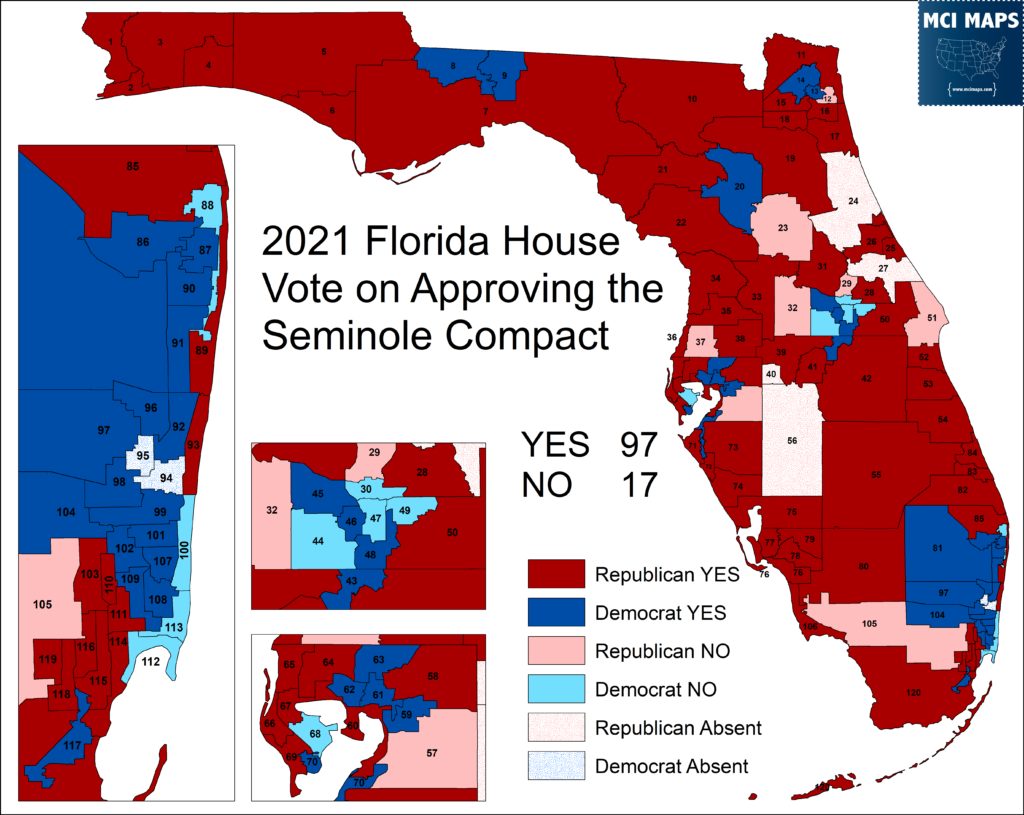
Another bill on the docket formally established the gaming control board. This provision did generate some controversy, as the bill text created a carve-out that allowed retiring lawmakers to be appointed to the board without any gap from appointment and the end of the legislative term (and you can bet certain lawmakers are in the mix for appointments). This issue led to debate in the chamber, but the opposition wasn’t strong enough to prevent passage. The Senate passed the bill 26-13. House passage was much broader. The house vote only saw opposition from a handful of liberal Democrats and anti-gambling lawmakers.
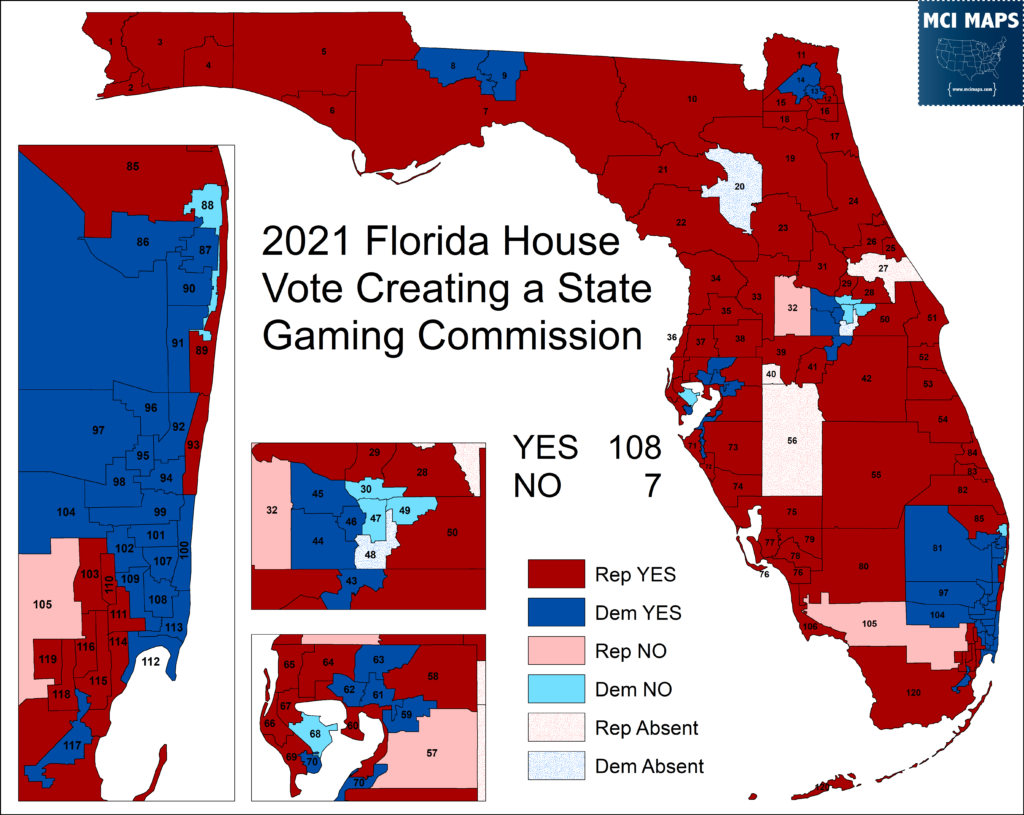
The third bill creating a public records exception for matters before the gaming commission (to allow privacy while investigations went on). This was broadly popular, passing 38-1 in the Senate and generating two no votes in the house. Both house NOs were liberal Democrats Omari Hardy and Anna Eskamani – who both argued the whole process was being rushed and without enough input from members.
The final vote saw more legislative debate and maneuvering than any other vote in the session. This was the bill to decouple many forms of racing from the pari-mutuel facilities. These facilities have to run racing or Jai alai to keep their slots or card games. However, the decoupling bill allowed former greyhound tracks (closed due to the 2018 amendment), the jai alai centers, and standardbred horse racing tracks to continue gaming without running races/games. Thoroughbred racing, however, was mandated to continue if those tracks wanted to offer games. The reason for that exception was that the industry was deemed “too big” and would collapse otherwise. Standardbred racing (horse with carriage) was not so lucky. Only one standardbred track remains – located in Broward County. The track, Isle Casino Racing, is eager to dump the sport and focus just on non-track gambling.
Broward’s HD-97 Representative, Dan Daley, led the push to treat standardbred racing the same as thoroughbred racing. Daley’s father worked in the industry and his pushing for the industry generated sympathy in the house. As a result of Daley’s push, the gaming committee approved an amendment to mandate the Isle Casino keep its standardbred track in order to run other games. However, this caused the house version to be different from the senate version – and Senate President Simpson made it clear he would not support the change. When the house came to vote on Wednesday, they were voting on the Senate version of the bill, not the house version approved in committee. Daley offered an amendment, the same passed in committee. Despite many Republicans making it clear they supported Daley’s issue, they conceded to the Senate’s plan and the amendment failed on a voice vote. The final decoupling bill then passed, but with most Democrats voting NO in solidarity with Daley.
With that vote, the Florida special session on gaming can to an end.
Moving Forward
The success of the special session was a major victory for Governor DeSantis, who has a big win going into his re-election bid. DeSantis also gets the credit for working out a deal that Rick Scott spent years unable to get (and their is no love loss between the two). However, the proposal still must be signed off by the Department of Interior (per the Indian Gaming Regulator Act) – though most expect it to be approved. The biggest question moving forward will be the provision over sports betting. Opponents of gambling – many of who backed Amendment 3 in 2018 – argue the legalization of sports betting is an expansion of gambling that Amendment 3 mandates voters approve of. Lawmakers and the tribe argue that since the servers for the website/apps that bets will be placed on will be located in tribal land, then betting isn’t actually taking place outside the reservation. If that sounds like a massive loophole – you are right. The Florida Courts will no doubt be deciding this – as lawsuits are already being promised. If sports betting is struck down by the courts, it will not effect the rest of the compact.
At the end of the day, this compact is a major development in the evolving style of gambling allowed in Florida.

